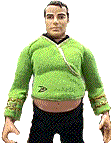Wednesday, November 16, 2005
you say "to-MAY-to"
Question #1 - unless you're British or boorish, does anyone really say "to-mah-to"?
Question #2 - why do we pronounce the "p" in the word helicopter? It is actually made up of two Greek words, the first being heliko (meaning spiral) and the second being pteron (meaning feather or wing, as in "pterodactyl" - dactyl being the Greek root for a finger or toe). The "p" is traditionally silent in this Greek consonent cluster (consider "Ptolemy"), yet we consistently belie the etymology of this word by pronouncing it.
Question #2 (and the real reason for this post) - how the heck am I supposed to pronounce the word data? Consider this excerpt from a poem published in Science Editor:
Of course we all know that the word is actually the plural form of the Latin datum, which is literally a "given", and is used as points of information accepted as they stand. This classical connection might lead us to a short vowel sound. However, if we are to believe the writers of Star Trek, it is correctly pronounced with a long vowel sound, and rhymes with feta and beta (assuming I am saying those correctly).
I'm not sure if I really care which is the more correct version... I just really wish I could decide for myself how I'm going to say it and stick with it every time. It's annoying to me that I have to pause in a conversation and consider how to pronounce such a mundane little word. I'll say it two different ways in the same sentence: "Yeah, so um, I went ahead and entered that dat-uh into the day-tuh base." Don't even get me started on coupons and routes.
Links to this post
Question #2 - why do we pronounce the "p" in the word helicopter? It is actually made up of two Greek words, the first being heliko (meaning spiral) and the second being pteron (meaning feather or wing, as in "pterodactyl" - dactyl being the Greek root for a finger or toe). The "p" is traditionally silent in this Greek consonent cluster (consider "Ptolemy"), yet we consistently belie the etymology of this word by pronouncing it.
Question #2 (and the real reason for this post) - how the heck am I supposed to pronounce the word data? Consider this excerpt from a poem published in Science Editor:
Many of us say ta
Pronounce the word as DAY-tuh.
Others think it ought ta
Be pronounced as DAH-tuh.
To others, that don’t matta,
They pronounce it as DAT-uh.
Of course we all know that the word is actually the plural form of the Latin datum, which is literally a "given", and is used as points of information accepted as they stand. This classical connection might lead us to a short vowel sound. However, if we are to believe the writers of Star Trek, it is correctly pronounced with a long vowel sound, and rhymes with feta and beta (assuming I am saying those correctly).
I'm not sure if I really care which is the more correct version... I just really wish I could decide for myself how I'm going to say it and stick with it every time. It's annoying to me that I have to pause in a conversation and consider how to pronounce such a mundane little word. I'll say it two different ways in the same sentence: "Yeah, so um, I went ahead and entered that dat-uh into the day-tuh base." Don't even get me started on coupons and routes.
Links to this post
Comments:
1. No
2. http://www.randomshirts.com/productinfo/copters.htm
2a. All three may be considered correct. www.dictionary.com
-J>
2. http://www.randomshirts.com/productinfo/copters.htm
2a. All three may be considered correct. www.dictionary.com
-J>
1. I recall Pippin of the Third Age of Middle Earth using the pronounciation "To-Mah-To" when speaking to Mr. Frodo upon the rocky crags of Weathertop. So, I guess that another people group who uses the pronounciation is small shirefolk. However, seeing as though the author of their tale was British, one could argue that they could be categorized as British, and at that point, I would agree with Jason's analysis. That is all.>
You asked, "why do we pronounce the "p" in the word helicopter?"
The answer is quite simple: It would sound funny to say helicoter, and others would be correcting us like I correct my 2 year old daughter when she leaves sounds out of words. :-)>
Post a Comment
The answer is quite simple: It would sound funny to say helicoter, and others would be correcting us like I correct my 2 year old daughter when she leaves sounds out of words. :-)>
Links to this post:
 |

